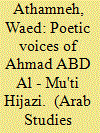| Srl | Item |
| 1 |
ID:
161092


|
|
|
|
|
| Summary/Abstract |
Abd al-Wahhab al-Bayati is one of the most prominent twentieth-century Arab poets. His poetry makes a drastic shift from politically committed in the 1950s and 1960s to metapoetic in the 1970s onward. In his post-Nasserist works, al-Bayati interrogates the role of poets and the function of their poetry. This article explores some of the main metapoetic themes in al-Bayati's poem “Meditations on the Other Face of Love,” which was published in 1979. The article argues that al-Bayati consciously uses reflexive poetry as a platform to blur the line between poetry and literary criticism and to declare his discontent with the literary scene and the political status quo in the Arab world. The article also examines some of the poetry by Nizar Qabbani and Muzaffar al-Nawab, in relation to that of al-Bayati. These three poets provide a poetic discussion of “terrorism” against the hegemony of political discourse, and demand that Arab citizens reject their undignified lives by adopting resistance and rejecting terrorism.
|
|
|
|
|
|
|
|
|
|
|
|
|
|
|
|
| 2 |
ID:
124615


|
|
|
|
|
| Publication |
2013.
|
| Summary/Abstract |
This article examines the poetic voices of Egyptian poet Ahmad Abd al-Mu'ti Hijazi in five representative poems written between 1950 and 2011. It investigates the role of major political events in the Arab world on his trajectory and poetic voice. The article argues that Hijazi changes his poetic voice in relation to the status quo in Egypt. The article concludes that these voices conflict and clash with one another. Hijazi publishes a collection of poetry after the eruption of the Egyptian Revolution in January 2011, to inspire his people, protest against Mubarak's regime, and regain his poetic voice.
|
|
|
|
|
|
|
|
|
|
|
|
|
|
|
|
| 3 |
ID:
151864


|
|
|
|
|
| Summary/Abstract |
In That Smell and Notes from Prison, Sonallah Ibrahim engages literary and feminist discourses in his political narrative against the Nasserist regime and the culture of commitment (iltizam) of the 1960s. Ibrahim's antihero is a newly released writer who is faced with the challenges of overcoming his failure to connect with women and society, and find a motivation to write. He realizes that most readers, writers and critics are not in favour of his literature of exposé, which refuses to depict or treat the ugly reality as a beautiful one. In foreshadowing the 1967 defeat and the impotence of Arabs, That Smell and Notes from Prison warns of a prolonged cultural and literary decay should political corruption override basic human and women's rights in the Arab world.
|
|
|
|
|
|
|
|
|
|
|
|
|
|
|
|